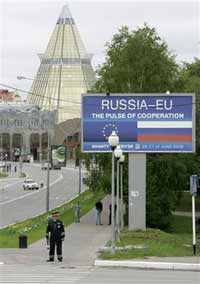Russia and European Union reach progress at cooperation talks
The first round of talks to conclude a new wide-range cooperation deal between Russia and the European Union will take place in Brussels on July 4, the joint statement of the Russia-EU summit said.

“The new Russia-EU agreement will be very short and framed,” President Dmitry Medvedev said.
The joint statement also said that the current agreement will be kept in effect until it is replaced with the new one. “We have agreed that the goal of our work will be the conclusion of the new strategic agreement that will establish the universal base for relations between Russia and the European Union for the foreseeable future and help develop the potential of our partnership, the statement runs.
It has been reported that the new agreement will be built on international commitments binding Russia and the European Union.
Medvedev also offers to outline possible dates and certain measures that will bring Russia and the European Union to visa-free entries.
European Commission President Jose Manuel Barroso hailed a "sincere and open" atmosphere at the talks and said that the new agreement should "open a new chapter in our relations."
The existing 10-year agreement signed in 1997 has automatically renewed pending the delays on reaching a new one, but the old deal has lost much of its meaning thanks to Russia's new oil and gas wealth and more assertive foreign policy stance.
Energy security tops the priority list. The EU wants Moscow to open its vast energy sector to investors, but the Kremlin firmly intends to maintain its control over Russia's oil and gas riches and energy pipelines.
Moscow, for its part, has pushed for more opportunity for its companies to invest in oil and gas distribution assets in Europe to diversify its energy business.
"Russia remains a key energy supplier for the EU; the EU will remain Russia's most important export market," Barroso said. "For both of us, as producers and consumers, energy security is paramount. In this era of high energy prices this is a message our citizens understand only too well."
The EU is represented by Barroso, Slovenian Prime Minister Janez Jansa, whose country currently holds the EU's rotating presidency, and EU foreign policy chief Javier Solana.
The bloc's trade chief, Peter Mandelson, said energy security could only be guaranteed if Russia joins the World Trade Organization. He said a wide-ranging economic treaty - within the framework of the new agreement - could not be completed while Russia remains unbound by WTO rules.
Russia , the only major country still outside the WTO, still faces major barriers to membership even after 14 years of negotiations to join the 152-member body, which sets the rules on global trade.
EU External Relations Commissioner Benita Ferrero-Waldner said Friday the bloc wanted "to insert principles of transparency and non-discrimination" into the economic relationship.
The summit gives the EU a chance to test the intentions of Medvedev, who was inaugurated in early May. While his predecessor and mentor, Vladimir Putin, rolled back many post-Soviet democratic reforms during his eight-year tenure, Medvedev has vowed to protect the rule of law, media freedom and human rights, the AP reports.
Skeptics in Russia and the West say Medvedev's pledges are no more than rhetoric and expect him to toe the course of his predecessor, who retains clout as Russia's prime minister. Putin was not attending the summit.
The EU wants Russia to commit to bolstering democratic reforms and preserving human rights as part of the new "strategic partnership" agreement it hopes to have in force by July 2009.
AP photo
Subscribe to Pravda.Ru Telegram channel, Facebook, RSS!




